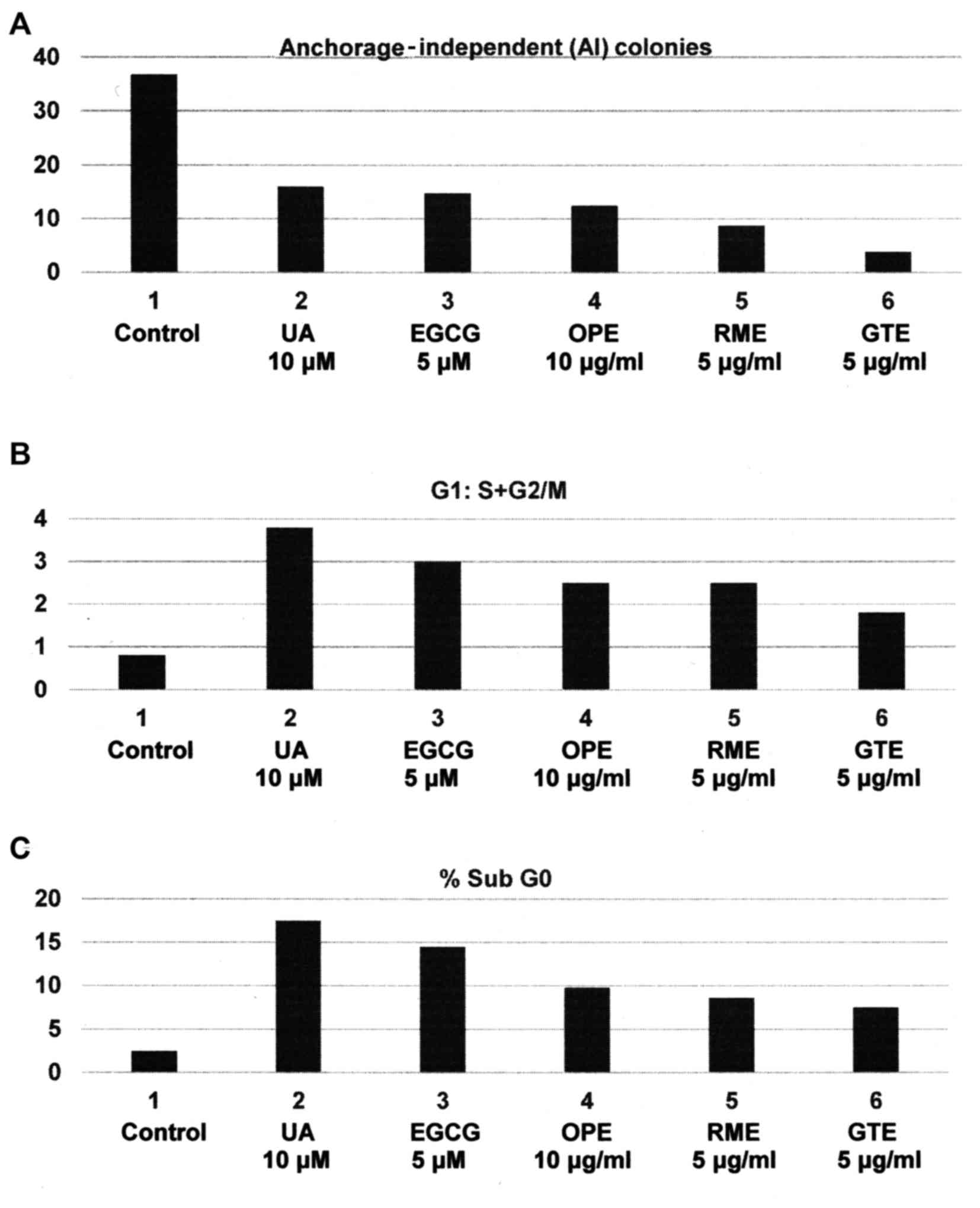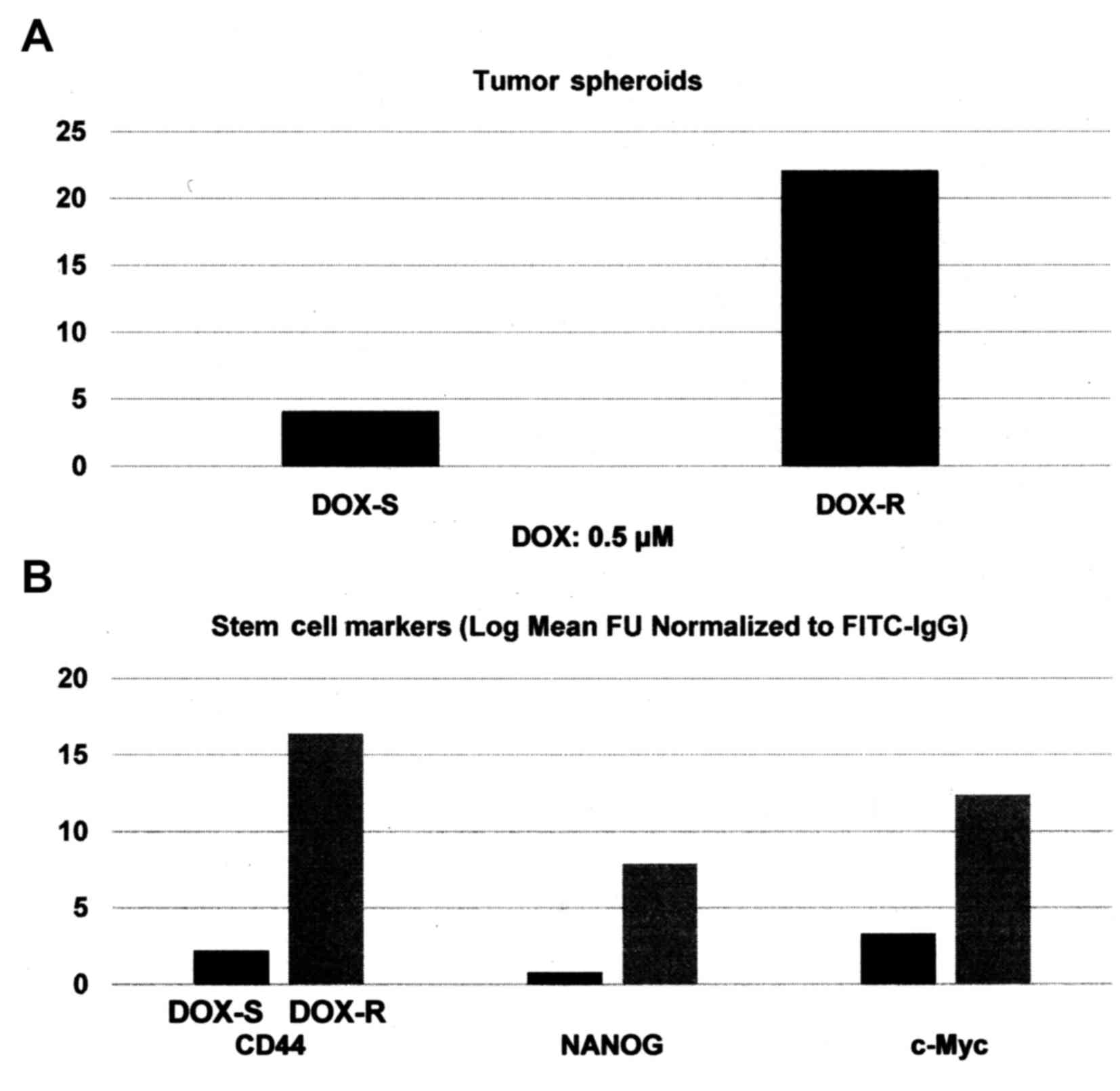|
1
|
American Cancer Society - Facts and
Figures. American Cancer Society. Atlanta: 2016.
|
|
2
|
Sørlie T, Perou CM, Tibshirani R, Aas T,
Geisler S, Johnsen H, Hastie T, Eisen MB, van de Rijn M and Jeffrey
SS: Gene expression patterns of breast carcinomas distinguish tumor
subclasses with clinical implications. Proc Natl Acad Sci USA.
98:10869–10874. 2001. View Article : Google Scholar : PubMed/NCBI
|
|
3
|
Baselga J and Swain SM: Novel anti-cancer
agents: Revisiting ERBB2 and discovering ERBB3. Nat Rev Cancer.
9:463–475. 2009. View
Article : Google Scholar : PubMed/NCBI
|
|
4
|
Dinh P, Satirou C and Piccart MJ: The
evaluation of treatment strategies: Aiming at the target.
16:S10–S16. 2007.
|
|
5
|
Anders CK, Winer EP, Ford JM, Dent R,
Silver DP, Sledge GW and Carey LA: Poly (ADP-ribose) inhibition:
Targeted therapy for triple negative breast cancer. Clin Cancer
Res. 16:4702–4710. 2010. View Article : Google Scholar : PubMed/NCBI
|
|
6
|
Dean M, Fojo T and Bates S: Tumor stem
cells and drug resistance. Nat Rev Cancer. 5:275–284. 2005.
View Article : Google Scholar : PubMed/NCBI
|
|
7
|
Tindle HA, Davis RB, Phillips RL and
Eisenburg DM: Trends in the use of complementary and alternative
medicines by US adults: 1997-2002. Altern Ther Health Med.
11:42–49. 2005.PubMed/NCBI
|
|
8
|
Molassiotis A, Scott JA, Kearney N, Pud D,
Magri M, Selvekerova S, Bruyns I, Fernadez-Ortega P, Panteli V,
Margulies A and Gudmundsdottir G: Complementary and alternative
medicine use in breast cancer patient in Europe. Support Care
Cancer. 14:206–267. 2006. View Article : Google Scholar
|
|
9
|
Helyer LK, Chin S, Chui BK, Fitzgerald B,
Verma S, Rakovitch E, Dranitsaris G and Clemons M: The use of
complementary and alternative medicine among patients with locally
advanced breast cancer. A descriptive study. BMC Cancer. 6:39–46.
2006. View Article : Google Scholar : PubMed/NCBI
|
|
10
|
Mukherjee B, Telang N and Wong GYC: Growth
inhibition of estrogen receptor positive human breast cancer cells
by Taheebo from the inner bark of Tabebuia avellandae tree. Int J
Mol Med. 24:253–260. 2009.PubMed/NCBI
|
|
11
|
Li G, Sepkovic DW, Bradlow HL, Telang NT
and Wong GYC: Lycium barbarum inhibits growth of estrogen receptor
positive human breast cancer cells by favorably altering estradiol
metabolism. Nutr Cancer. 61:408–414. 2009. View Article : Google Scholar : PubMed/NCBI
|
|
12
|
Telang NT, Li G, Sepkovic DW, Bradlow HL
and Wong GYC: Anti-proliferative effects of Chinese herb Cornus
officinalis in a cell culture model for estrogen receptor positive
clinical breast cancer. Mol Med Rep. 5:22–28. 2012.PubMed/NCBI
|
|
13
|
Telang N, Li G, Sepkovic D, Bradlow HL and
Wong GYC: Comparative efficacy of extracts form Lycium barbarum
bark and fruit on estrogen receptor positive human mammary
carcinoma MCF-7 cells. Nutr Cancer. 66:278–284. 2014. View Article : Google Scholar : PubMed/NCBI
|
|
14
|
Telang N, Li G, Katdare M, Sepkovic D,
Bradlow L and Wong GYC: Inhibitory effects of Chinese nutritional
herbs in isogenic breast carcinoma cells with modulated estrogen
receptor function. Oncol Lett. 12:3949–3957. 2016.PubMed/NCBI
|
|
15
|
Telang NT, Li G, Katdare M, Sepkovic DW,
Bradlow HL and Wong GYC: The nutritional herb Epimedium
grandiflorum inhibits the growth in a model for the Luminal A
molecular subtype of breast cancer. Oncol Lett. 13:2477–2482.
2017.PubMed/NCBI
|
|
16
|
Katdare M, Osborne MP and Telang NT: Novel
cell culture models for prevention of human breast cancer. Int J
Oncol. 22:505–519. 2003.(Review).
|
|
17
|
Katdare M, Osborne MP and Telang NT: Soy
isoflavone genestein modulates cell cycle progression and induces
apoptosis in HER-2/neu oncogene expressing human breast epithelial
cells. Int J Oncol. 21:809–816. 2002.PubMed/NCBI
|
|
18
|
Telang N and Katdare M: Epithelial cell
culture models for prevention and therapy of clinical breast cancer
(Review). Oncol Lett. 3:744–750. 2012.PubMed/NCBI
|
|
19
|
Telang NT, Nair HB and Wong GYC: Efficacy
of Tabebuia avellandae extract on a cell culture model for triple
negative breast cancer. Cancer Res. 74:(Suppl.): SABCS Abstract no.
P5-14-02. 2014.
|
|
20
|
Telang NT, Nair HB and Wong GYC: Effect of
Cornus officinalis (CO) on a model for triple negative breast
cancer. Cancer Res. 75:(Suppl.): SABCS Abstract no. P3-09-04.
2015.
|
|
21
|
Telang N, Nair HB and Wong GYC: Efficacy
of Dipsacus asperoides (DA) in a model for triple negative breast
cancer. Cancer Res. 76:(Suppl.): SABCS Abstract no. P4-13-04.
2016.
|
|
22
|
Stampfer MR and Bartley JC: Induction of
transformation and continuous cell lines from normal human mammary
epithelial cells after exposure to Benzo (α) pyrene. Proc Natl Acad
Sci USA. 82:2394–2398. 1985. View Article : Google Scholar : PubMed/NCBI
|
|
23
|
Neve RM, Chin K, Fridlyand J, Yeh J,
Baehner FL, Fevr T, Clark L, Bayani N, Coppe JP, Tong F and Speed
T: A collection of breast cancer cell lines for the study of
functionally distinct cancer subtypes. Cancer Cell. 10:515–527.
2006. View Article : Google Scholar : PubMed/NCBI
|
|
24
|
Subik K, Lee JF, Baxter L, Strzepek T,
Costello D, Crowley P, Xing L, Hung MC, Bonfiglio T, Hicks DG and
Tang P: Expression patterns of ER, PR, HER-2, CK5/6, Ki67 and AR by
immuno-histochemical analysis in breast cancer cell lines. Breast
Cancer. 4:35–41. 2010.PubMed/NCBI
|
|
25
|
Hudis CA and Gianni L: Triple negative
breast cancer: An unmet medical need. Oncologist. 16:1–11. 2011.
View Article : Google Scholar : PubMed/NCBI
|
|
26
|
Lin NU, Vanderplas A, Hughes ME, Theriault
RL, Edge SB, Wong YN, Blayney DW, Niland JC, Winer EP and Weeks JC:
Clinicopathological features, patterns of recurrence and survival
amongst women with triple negative breast cancer in National
Comprehensive Cancer Network. Cancer. 118:5463–5472. 2012.
View Article : Google Scholar : PubMed/NCBI
|
|
27
|
Gorsky DH: Integrative oncology: Really
the best of both worlds? Nat Rev Cancer. 14:692–700. 2014.
|
|
28
|
Huang MT, Ho CT, Wang ZY, Ferraro T, Lou
YR, Stauber K, Ma W, Georgiadis C, Laskin JD and Conney AH:
Inhibition of skin tumorigenesis by rosemary and its constituents
carnosol and ursolic acid. Cancer Res. 54:701–708. 1994.PubMed/NCBI
|
|
29
|
Subbaramaiah K, Chung WJ, Michaluart P,
Telang N, Tanabe T, Inoue H, Jang M, Pezzuto JM and Dannenberg AD:
Resveratrol inhibits Cyclo-oxygenase transcription and activity in
phorbol ester treated human mammary epithelial cells. J Biol Chem.
273:21875–21882. 1998. View Article : Google Scholar : PubMed/NCBI
|
|
30
|
Subbaramaiah K, Michaluart P, Sporn MB and
Dannenberg AJ: Ursolic acid inhibits cyclo-oxygenase-2
transcription in human mammary epithelial cells. Cancer Res.
60:2399–2404. 2000.PubMed/NCBI
|
|
31
|
Subbaramaiah K, Cole PA and Dannenberg AJ:
Retinoids and carnasol suppress cyclo-oxygenase-2 transcription by
CREB binding protein/p300-dependent and independent mechanisms.
Cancer Res. 62:2522–2530. 2002.PubMed/NCBI
|
|
32
|
Cox LA, Chen G and Lee EY: Tumor
suppressor genes and their role in breast cancer. Breast Cancer Res
Treat. 32:19–38. 1994. View Article : Google Scholar : PubMed/NCBI
|
|
33
|
Burkhart DL and Sage J: Cellular
mechanisms of tumor suppression by the retinoblastoma gene. Nat Rev
Cancer. 8:671–682. 2008. View
Article : Google Scholar : PubMed/NCBI
|
|
34
|
Bosco EE and Knudson ES: RB in breast
cancer: At the crossroads of tumorigenesis and treatment. Cell
Cycle. 6:667–671. 2007. View Article : Google Scholar : PubMed/NCBI
|
|
35
|
Van Arsdale T, Boschoff C, Arndt KT and
Abraham RT: Molecular pathways: Targeting the Cyclin D-CDK 4/6 axis
for cancer treatment. Clin Cancer Res. 21:2905–2910. 2015.
View Article : Google Scholar : PubMed/NCBI
|
|
36
|
Muller PAJ and Vousden KH: Mutant p53 in
cancer: New functions and therapeutic opportunities. Cancer Cell.
25:304–317. 2014. View Article : Google Scholar : PubMed/NCBI
|
|
37
|
Ye L, Jia Y, Ji KE, Sanders AJ, Xue K, Ji
J, Mason MD and Jiang WG: Traditional Chinese medicine in the
prevention and treatment of breast cancer and cancer metastasis.
Oncol Lett. 10:1240–1250. 2015.PubMed/NCBI
|
|
38
|
Stingl J and Caldas C: Molecular
heterogeneity of breast carcinoma and the cancer stem cell
hypothesis. Nat Rev Cancer. 7:791–799. 2007. View Article : Google Scholar : PubMed/NCBI
|
|
39
|
Lobo NA, Shimono Y, Quan D and Clarke MF:
The biology of cancer stem cells. Annu Rev Cell Dev Biol.
23:675–699. 2007. View Article : Google Scholar : PubMed/NCBI
|
|
40
|
Patel SA, Ndabahaliye A, Lim PK, Milton R
and Rameshwar P: Challenges in the development of future treatments
for breast cancer stem cells. Breast Cancer. 2:1–11.
2010.PubMed/NCBI
|
|
41
|
Telang N: Putative cancer initiating stem
cells in cell culture models for molecular subtypes of clinical
breast cancer. Oncol Lett. 10:3840–3846. 2015.PubMed/NCBI
|
|
42
|
Telang N: Anti-inflammatory drug
resistance selects putative cancer stem cells in a cellular model
for genetically predisposed colon cancer. Oncol Lett (In
press).
|
|
43
|
Zhang F, Song C, Ma Y, Tang L, Xu Y and
Wang H: Effect of fibroblasts on breast cancer cell mammosphere
formation and regulation of stem cell related gene expression. Int
J Mol Med. 28:365–371. 2011.PubMed/NCBI
|
|
44
|
Takahashi K, Tanabe K, Ohnuki M, Narita M,
Ichisaka T, Tomoda K and Yamanaka S: Induction of pluripotent stem
cells from adult human fibroblasts by defined factors. Cell.
131:861–872. 2007. View Article : Google Scholar : PubMed/NCBI
|
|
45
|
Park IH, Zhao R, West JA, Yabuuci A, Huo
H, Ince TA, Lerou PH, Lansch MW and Daley GQ: Reprograming of human
somatic cells to pluripotency with defined factors. Nature.
451:141–146. 2008. View Article : Google Scholar : PubMed/NCBI
|
|
46
|
Yu J, Hu K, Smuga-Otto K, Tian S, Stewart
R, Slukvin II and Thomson JA: Human induced pluripotent stem cells
free of vector and transgene sequences. Science. 324:797–800. 2009.
View Article : Google Scholar : PubMed/NCBI
|
|
47
|
Ishida R, Koyanagi-Aoi M, Oshima N, Kakeji
Y and Aoi T: The tissue reconstructing ability of colon CSCs is
enhanced by FK506 and suppressed by GSK3 inhibition. Mol Cancer
Res. July 14–2017.(Epub ahead of print). https://doi.org/10.1158/1541-7786.MCR-17-0071
View Article : Google Scholar
|
















